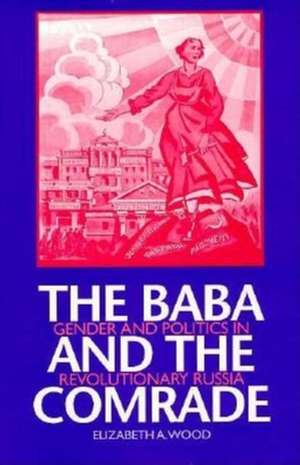The Baba and the Comrade – Gender and Politics in Revolutionary Russia
Autor Elizabeth A. Wooden Limba Engleză Paperback – 21 iul 2000
..". a well-organized, sophisticated analysis of the difficulties involved in attempting to reconcile ideology with political, economic, and cultural realities.: The Russian Review
..". a highly persuasive, revealing, and well-documented account of early Bolshevik policy, practice, and language pertaining to the baba problem and the unexpected ways female and male comrades responded to the party-state s tutelary role toward women." Slavic Review
"This is a rich and densely argued study that embeds the story of the zhenotdel in the context of the political struggles and institutional structures of this formative period of the Russian Revolution. Wood demonstrates clearly the dilemma of whether women party activists should serve the party or their constituents." American Historical Review
"Wood s convincing work is a welcome addition to the growing literature on the gender-role traditionalism the Communists reinstitutionalized with their revolution." The Women s Review of Books
How could the baba traditionally, the "backward" Russian woman be mobilized as a "comrade" in the construction of a new state and society? Drawing on recently opened archives, Elizabeth A. Wood explains why the Bolsheviks proved unable and ultimately unwilling to realize their ideological notions of a gender-neutral society. Focusing on the creation and activities of the zhenotdel, a special women s section within the Russian Communist Party, Wood reconstructs the ways in which notions of gender sameness and difference both facilitated and complicated Bolshevik efforts at state building during the Civil War and the New Economic Policy."
Preț: 242.92 lei
Nou
Puncte Express: 364
Preț estimativ în valută:
46.49€ • 48.26$ • 38.76£
46.49€ • 48.26$ • 38.76£
Carte tipărită la comandă
Livrare economică 24 martie-07 aprilie
Preluare comenzi: 021 569.72.76
Specificații
ISBN-13: 9780253214300
ISBN-10: 0253214300
Pagini: 328
Dimensiuni: 155 x 233 x 24 mm
Greutate: 0.51 kg
Editura: MH – Indiana University Press
ISBN-10: 0253214300
Pagini: 328
Dimensiuni: 155 x 233 x 24 mm
Greutate: 0.51 kg
Editura: MH – Indiana University Press
Cuprins
Table of Contents:
Acknowledgements
Introduction
I. The Woman Question
1. The Bolsheviks and the Genealogy of the Woman Question
II. Gender in the Context of State-Making and Civil War
2. Sharp Eyes and Tender Hearts: Passing New Legislation and Fighting the Civil War
3. Identity and Organisation: Creating the Women's Sections of the Communist Party
4. War Communism at Its Height: Lobbying on Behalf of Women Workers
III. The New Threat to the Social Contract
5. The Liquidation Crisis in Zhenotdel Politics
6. The Crisis in Economics: The Social Contract Endangered
7. The New Threat: Zhenotdel Criticisms of the Social Costs of NEP
8. Daily Life and Gender Transformation
Conclusion
Notes
Bibliography
Index
Acknowledgements
Introduction
I. The Woman Question
1. The Bolsheviks and the Genealogy of the Woman Question
II. Gender in the Context of State-Making and Civil War
2. Sharp Eyes and Tender Hearts: Passing New Legislation and Fighting the Civil War
3. Identity and Organisation: Creating the Women's Sections of the Communist Party
4. War Communism at Its Height: Lobbying on Behalf of Women Workers
III. The New Threat to the Social Contract
5. The Liquidation Crisis in Zhenotdel Politics
6. The Crisis in Economics: The Social Contract Endangered
7. The New Threat: Zhenotdel Criticisms of the Social Costs of NEP
8. Daily Life and Gender Transformation
Conclusion
Notes
Bibliography
Index
Recenzii
" . . . a highly persuasive, revealing, and well-documented account of early Bolshevik policy, practice, and language pertaining to the 'baba problem' and the unexpected ways female and male comrades responded to the party-state's tutelary role toward women." --Slavic Review
". . . a well-organised, sophisticated analysis of the difficulties involved in attempting to reconcile ideology with political, economic, and cultural realities." --The Russian Review
"Meticulously researched, impressively documented, and engrossingly written, [the] work is much more than an examination of the successes, tribulations, and obstacles experienced by the zhenotdely (Soviet women's sections). . . . contributes to a long-overdue reconception of the New Economic Policy" Choice
" . . . a well-organised, sophisticated analysis of the difficulties involved in attempting to reconcile ideology with political, economic, and cultural realities." --The Russian Review
" . . . a highly persuasive, revealing, and well-documented account of early Bolshevik policy, practice, and language pertaining to the "baba problem" and the unexpected ways female and male comrades responded to the party-state's tutelary role toward women." --Slavic Review
"This is a rich and densely argued study that embeds the story of the zhenotdel in the context of the political struggles and institutional structures of this formative period of the Russian Revolution. Wood demonstrates clearly the dilemma of whether women party activists should serve the party or their constituents." --American Historical Review
"Wood's convincing work is a welcome addition to the growing literature on the gender-role traditionalism the Communists reinstitutionalized with their revolution." --The Women's Review of Books
"Wood enriches the existing tradition of women's history by focusing not only on the experience of real women's lives, but also on 'gender as an organising principle.' . . . This book will be of particular interest to specialists in and students of the early Soviet state and gender studies." --H- Russia
". . . a well-organised, sophisticated analysis of the difficulties involved in attempting to reconcile ideology with political, economic, and cultural realities." --The Russian Review
"Meticulously researched, impressively documented, and engrossingly written, [the] work is much more than an examination of the successes, tribulations, and obstacles experienced by the zhenotdely (Soviet women's sections). . . . contributes to a long-overdue reconception of the New Economic Policy" Choice
" . . . a well-organised, sophisticated analysis of the difficulties involved in attempting to reconcile ideology with political, economic, and cultural realities." --The Russian Review
" . . . a highly persuasive, revealing, and well-documented account of early Bolshevik policy, practice, and language pertaining to the "baba problem" and the unexpected ways female and male comrades responded to the party-state's tutelary role toward women." --Slavic Review
"This is a rich and densely argued study that embeds the story of the zhenotdel in the context of the political struggles and institutional structures of this formative period of the Russian Revolution. Wood demonstrates clearly the dilemma of whether women party activists should serve the party or their constituents." --American Historical Review
"Wood's convincing work is a welcome addition to the growing literature on the gender-role traditionalism the Communists reinstitutionalized with their revolution." --The Women's Review of Books
"Wood enriches the existing tradition of women's history by focusing not only on the experience of real women's lives, but also on 'gender as an organising principle.' . . . This book will be of particular interest to specialists in and students of the early Soviet state and gender studies." --H- Russia
Descriere
How could the baba--traditionally the "backward" Russian woman--be mobilized as a "comrade" in the construction of a new state and society? Drawing on newly available archival materials, historian Elizabeth Wood explores the Bolshevik government's campaign to draw women into the public sphere and involve them in the world of politics in the early Soviet years.
















